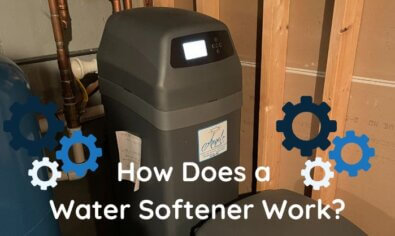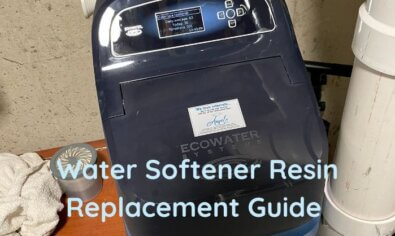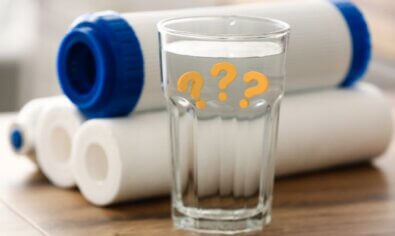Which Under Sink Water Filter is the Perfect Fit for My Home?
This blog features the following key takeaways:
• An EPA-certified water test will reveal which drinking water contaminants you need to remove.
• Reverse osmosis systems provide the most thorough filtration of any under sink water filter.
• Activated carbon filters are also popular for removing a variety of contaminants.
• The best under sink systems are NSF/ANSI certified, American made and BPA-free.
• Professional installation and maintenance will keep your filter running properly.
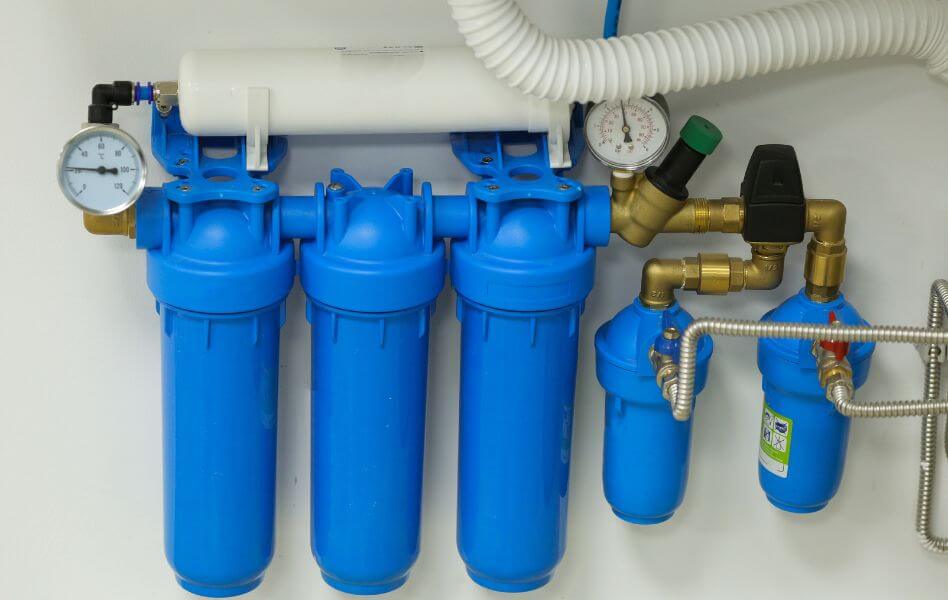
Under sink filters can easily support the daily drinking water needs of a family of four to six people. They are also less expensive than whole house water filters, which may not be necessary if you only need clean drinking water at one tap in your home. For most families, an under sink filter is an effective and affordable option for safe drinking water.
However, as you may have noticed, many different types of under sink water filters are available for purchase. Choosing between them likely seems intimidating because you don’t want to make the wrong choice for your home.
But there’s no need to get discouraged. We’re here to simplify things for you!
In this post, we’ll guide you through the process of finding the best under sink water filter for your home. By following these steps, you’ll know what’s polluting your water, how to get it out and the best way to get the trustworthy filtration your family needs.
Start by Finding Out What’s in Your Water
Before we get into the different types of under sink water filters, we need to examine your tap water. Our goal in doing so is to pinpoint which contaminants you need to remove. Once we know that, we can match you up with the right type of under sink filter for your situation.
Each city and town throughout the United States has its own assortment of toxins in its water, and some water supplies are more polluted than others. The amount of contamination can even vary from house to house, especially for houses with well water. Because of this, you need to get as much detailed information about the contents of your water as possible.
You can start by looking up recent water quality reports for your city. A great resource for this is the Environmental Working Group (EWG). The EWG is an independent nonprofit organization committed to raising awareness of environmental health concerns, including water pollution. The EWG’s online tap water database allows you to input your zip code and see which contaminants were recently detected that exceed health guidelines.
Your local water quality report will give you a good idea of what you need to filter out. However, the best way to know for sure which toxins you’re dealing with is to have your water tested.
At Angel Water, we perform EPA-certified water testing to get a detailed readout of a household’s water quality information. We quickly complete these tests in the home, help the homeowners understand the results and provide recommendations for the best water treatment solutions.
Find the Under Sink Water Filter for Your Contaminants
Your local water quality report and test results will show you what you need to remove from your water. The next step is to find the best-qualified tap water filter for the job.
As we mentioned above, there are many types of under sink water filters available. But we don’t want to overwhelm you with too many options at once. Instead, let’s start with the basics of how these water filters work.
There are two main categories of under sink filters: single-stage and multi-stage. Single-stage filters are the simplest type of tap water filter because they only use one filter material. Conversely, multi-stage filters put the water through two or more types of filter material to remove a wider variety of contaminants.
If your water only contains a small assortment of toxins, then a single-stage filter may be all you need. However, many households often need multi-stage filters to receive complete protection.
As you might imagine, multi-stage filters tend to be more expensive than their single-stage counterparts. Yet, this extra cost can be worth it to stay safe and healthy.
Activated Carbon vs. Reverse Osmosis Filters
Understanding the difference between single and multi-stage filters is key in choosing between the two most popular under sink filters available: activated carbon filters and reverse osmosis systems. Most of the tap water filters you come across will be one of these two types, and as we’ll see, one is much more effective than the other.
Activated carbon filters are single-stage systems that filter water by running it through a specially designed carbon medium. The carbon material absorbs many toxins, including organic compounds, chlorine and trihalomethanes, to remove them from the water. Activated carbon filters also improve the water’s taste and smell.
Reverse osmosis (RO) systems are multi-stage systems that provide the most thorough filtration of any under sink filter on the market. RO systems typically contain anywhere from three to five types of filters, including sediment and carbon filters.
The main filtration device in an RO system is a semipermeable membrane. The microscopic holes in this membrane are too small for most contaminants to make it through, but water molecules fit through just fine. As a result, NSF/ANSI 58 certified RO systems can remove all the following:
- Organic compounds
- Chlorine
- Trihalomethanes
- Bacteria
- Viruses
- Parasites
- Lead
- Hexavalent Chromium
- Dissolved solids
- Arsenic
- Iron
- And more!
As you can see, reverse osmosis systems are much more effective than activated carbon filters. The only drawbacks that come with NSF/ANSI 58 certified RO systems are they’re more expensive, take up more space under the sink and produce more wastewater than activated carbon filters. Still, if you want the strongest protection from contamination, a quality RO system is your best bet.
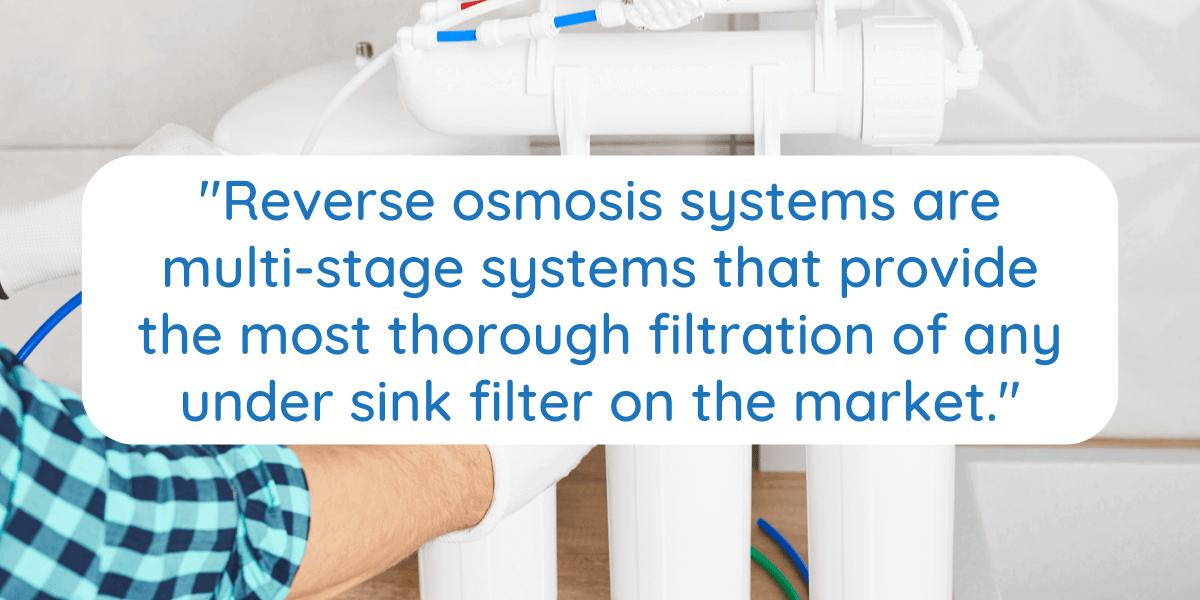
Other Types of Specialized Filters
You can also find single-stage or multi-stage filters with filtration media for specific pollutants. Here is an overview of the other specialized filters and the main toxins they can remove:
- Activated Alumina (AA) Filters remove arsenic, fluoride, chromium and selenium.
- Ion Exchange Systems remove charged contaminants, like arsenic, hexavalent chromium, calcium, and radium.
- Iron Filters take out iron, magnesium and hydrogen sulfide.
- KDF Filters eliminate chlorine, chromium, lead, mercury, bacteria, algae, fungi and more.
- Sediment Filters remove dirt, sediment and other large solid particles.
- UV Filters render harmful bacteria and other viruses inert. (However, these filters are not approved by some states’ departments of public health, such as Illinois.)
Depending on which contaminants you’re dealing with, your best fit may be a multi-stage system combining two or more of these types of filters.
Unsure About Your Water Quality? Get a Free Water Test Today!
Contaminants can affect the safety and taste of your water. Get a free water test to check your water quality and see if a reverse osmosis system can help provide clean, pure drinking water.

Get more valuable water education content in your inbox!
Subscribe to Angel Water’s monthly email newsletter.
Pick the System with the Right Credentials
So, you know what type of filtration system you want. Great! The only issue is many companies produce that type of system. Which brand should you trust for your under sink water filter?
Don’t get distracted by brand recognition or fancy packaging. Instead, focus on these key indicators of a truly trustworthy filter:
NSF/ANSI Certification
The best under sink filters have certification from the National Sanitation Foundation (NSF) and the American National Standards Institute (ANSI). These organizations thoroughly test water treatment equipment to ensure each device lives up to its promises.
Different types of under sink water filters receive different types of NSF/ANSI certification to prove their trustworthiness. For example, reverse osmosis systems need NSF/ANSI 58 certification, and activated carbon filters require both NSF/ANSI 42 and 53 certifications. So, make sure you check the label for those certifications before purchasing a filter.
100% American Made
You’ll also want to check the fine print to see where the water filter was made. Unfortunately, some under sink water filter manufacturers use low-quality, foreign-made parts to save money when constructing their systems. These shoddy parts reduce the effectiveness of the filter, putting your health at risk.
In contrast, the most trustworthy systems are completely made in America with parts that meet our country’s strict safety regulations.
BPA-Free
Your filter should remove contaminants, not add them to your water. Unfortunately, some water filters are made with bisphenol A (BPA), an industrial chemical known to cause health problems in infants. While many filter manufacturers are phasing BPA out of their production process, you should still watch out for it when shopping around.
Protects Against “Dead Water”
You also don’t want an under sink water filter to be so thorough that it even removes minerals that are good for you. When a filter does this it produces what some refer to as dead water.
One of the main criticisms of reverse osmosis filters is they can produce dead water. But the best RO systems add minerals back into the water to make up for this.
So, make sure your drinking water system won’t leave your water without healthy minerals like calcium before you purchase it.
Invest in Professional Installation and Maintenance
Getting the right water filter for your sink is only half the battle. You also need to install it correctly for it to work right. Improper installation could compromise the quality of your system and void your warranty.
You can try to install an under sink water filter on your own, but doing so can be tricky. A safer bet is to hire a licensed professional to do it for you.
The same goes for maintenance. Under sink water filters require maintenance at least once a year to stay in good shape. If they don’t receive periodic filter replacement and cleaning, they will eventually start to malfunction and break down. While paying for professional maintenance every year may seem burdensome, it will be cheaper than the bill for repairing or replacing your unit if it breaks down.
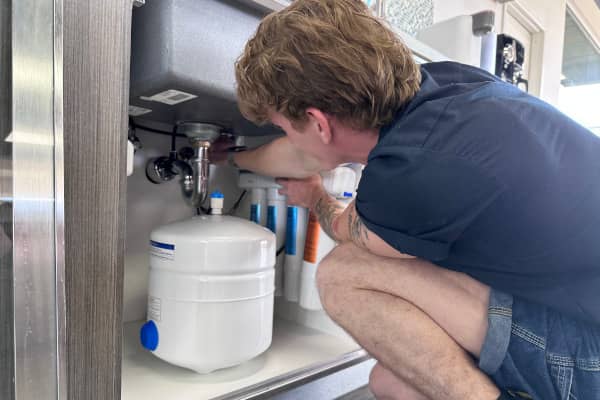
You Will Find Your Ideal Filter!
As you can see, choosing an under sink water filter isn’t as overwhelming as it may have seemed at first. Once you know what’s in your water, it’s as simple as selecting the best-qualified filter with trustworthy credentials and having it professionally installed and maintained. Remember, you can buy a filter or be the filter!
Angel Water is here to help you with all these steps. We provide in-home water testing and a wide selection of under sink filters in the Northern Illinois region and West Palm Beach, FL.
We especially recommend our NSF/ANSI 58 certified reverse osmosis systems from PurASure. You can learn more about them at the link below.
Ready for Cleaner Water? Schedule an Appointment Now!
Ensure your family has access to clean, great-tasting water. Schedule an appointment with our specialists today to learn how a reverse osmosis system can purify your drinking water.

